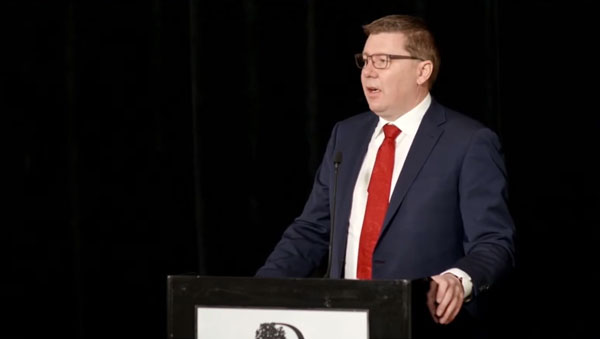
Though it was headlined by an announcement about vaccinations, Premier Scott Moe’s address to the Saskatchewan Association of Rural Municipalities (SARM) convention on March 10 included some specific announcements targeted at Rural Municipalities. This includes announcements of funding for roads and expansion of channel clearing.
“This morning I want to provide some details on how we are going to build a stronger Saskatchewan in the months and in the years to come,” Moe said.
Moe also discussed previous funding initiatives such the Municipal Economic Enhancement Program (MEEP) and the fast tracking of revenue sharing during the beginning of the COVID before going into the roads announcement.
“That is why today I am announcing that we are going to invest an additional $11 million into rural integrated roads for growth program,”
The $11 million announced was on top of $28 million that is already budgeted and was announced in June 2020.
“This money we know will be used and used efficiently to construct and repair roads in your municipality, to construct and repair bridges and culverts in R.M.s right across this province and it’s a partnership that we are very proud of,” Moe said.
According to the SARM website, the RIRG programs funding is provided for roads, bridges and large diameter culverts. According to the province the RIRG is an important component of the province’s plan to re-build 100 roads over the next three years and 100 bridges over the next four years.
Through the first two phases of funding, 89 road projects and 45 bridge projects have been provincially approved, receiving nearly $38 million in support. Several of the bridge projects are still going through the federal approval process.
Moe said that making the announcement now will ensure projects will be ready for the next construction season. The province has committed to re-build 100 roads over the next three years and 100 bridges over the next four years.
As well, Moe announced $2 million over two years in funding to expand channel clearing for Rural Municipalities across Saskatchewan. This matter has been a concern for a number of years in municipalities. He explained that MLAs had heard for a number of years about this issue and it was time to address it.
“I’m hoping that that investment is an indication that the Water Security Agency is going to be more responsive to some of the challenges that you have been facing and in the future we will be more responsive and be willing to work in partnership to deal with the water and drainage issues that you are experiencing in your community in a way that doesn’t unduly hinder economic growth in this province and doesn’t hinder the economic recovery that we all seek,” Moe said.
The Water Security Agency originally budgeted $600,000 over two years for channel clearing. This increase in funding will allow for the program to grow to $500,000 for the 2020-21 fiscal year. In 2021-22, funding will increase again to $1.5 million for a total investment of $2 million over two years. This is an additional $1.4 million over two years to support RMs with channel clearing activities.
Channel clearing involves removing beaver dams, debris, trees and shrubs, and the removal of silt and blow dirt from and along natural channels, lessening the possibilities of blockages that can cause flooding and damage to infrastructure.
Obstructed creeks and channels cause flooding and erosion problems to many RMs and local landowners. This program supports RMs in the removal of these obstructions.
“Our members welcome the news of this timely additional support for a needed program, especially as we enter the spring season,” SARM President Ray Orb said in a release.
“Our communities are concerned not only about proactively dealing with situations like flooding, but also practicing good water management that protects our ratepayers investments.”
Clearing dense vegetation can also reduce unwanted nutrients from water bodies and is an essential component of any long-term water management plan.
Moe also discussed the meeting of campaign commitments such as the 10 per cent reduction on power bills, that the small business tax rate is temporarily cut to zero, the Home Renovation Tax Credit and the SGI rebate which is coming in May. The rebate is due to a decline in accidents and the performance of the SGI portfolio.
“In our view this money belongs to the people of Saskatchewan,” Moe said.

